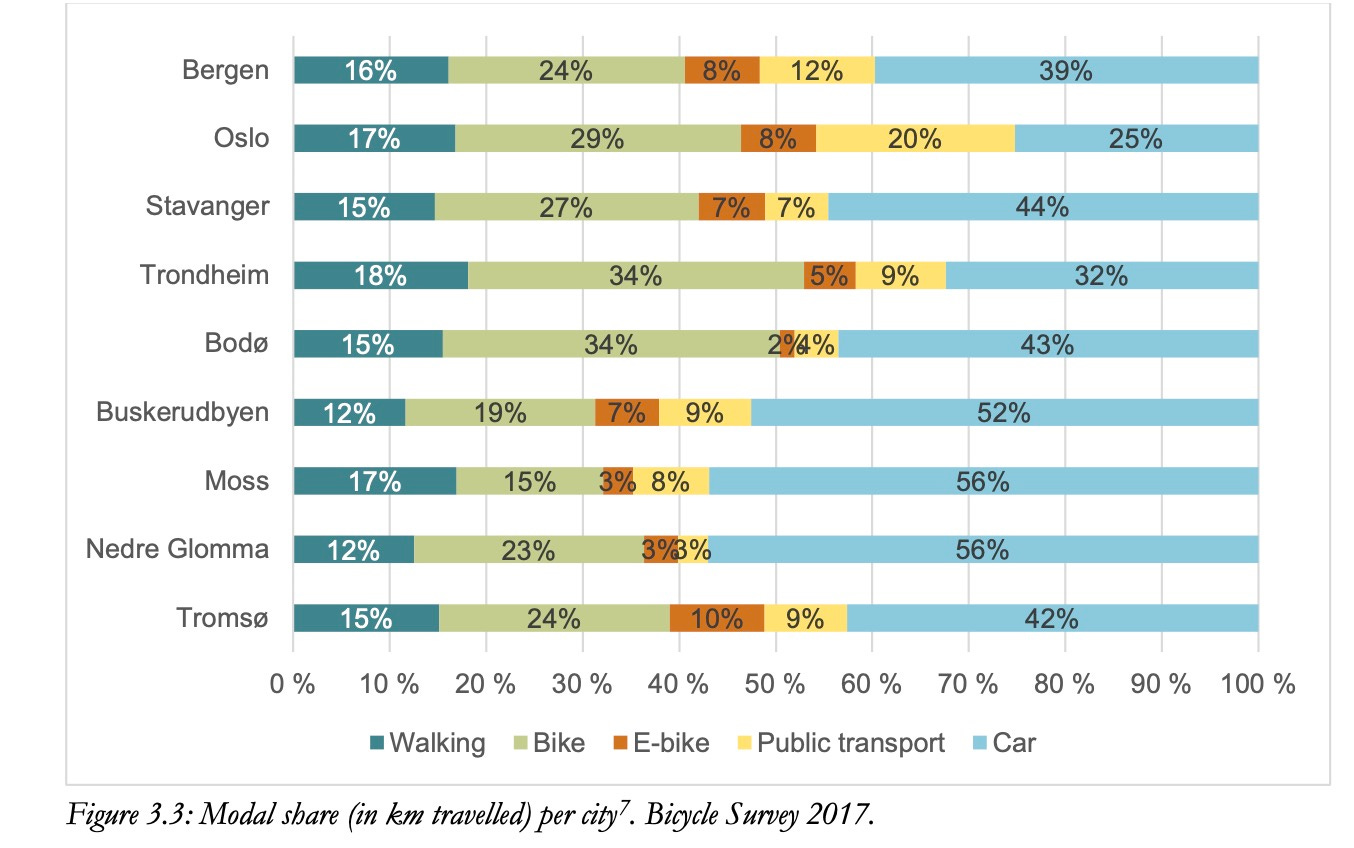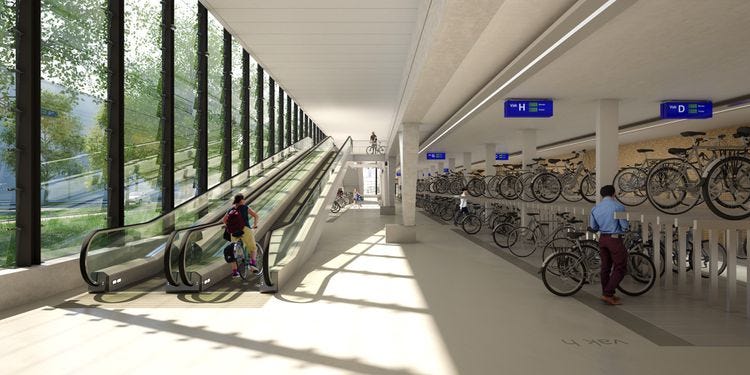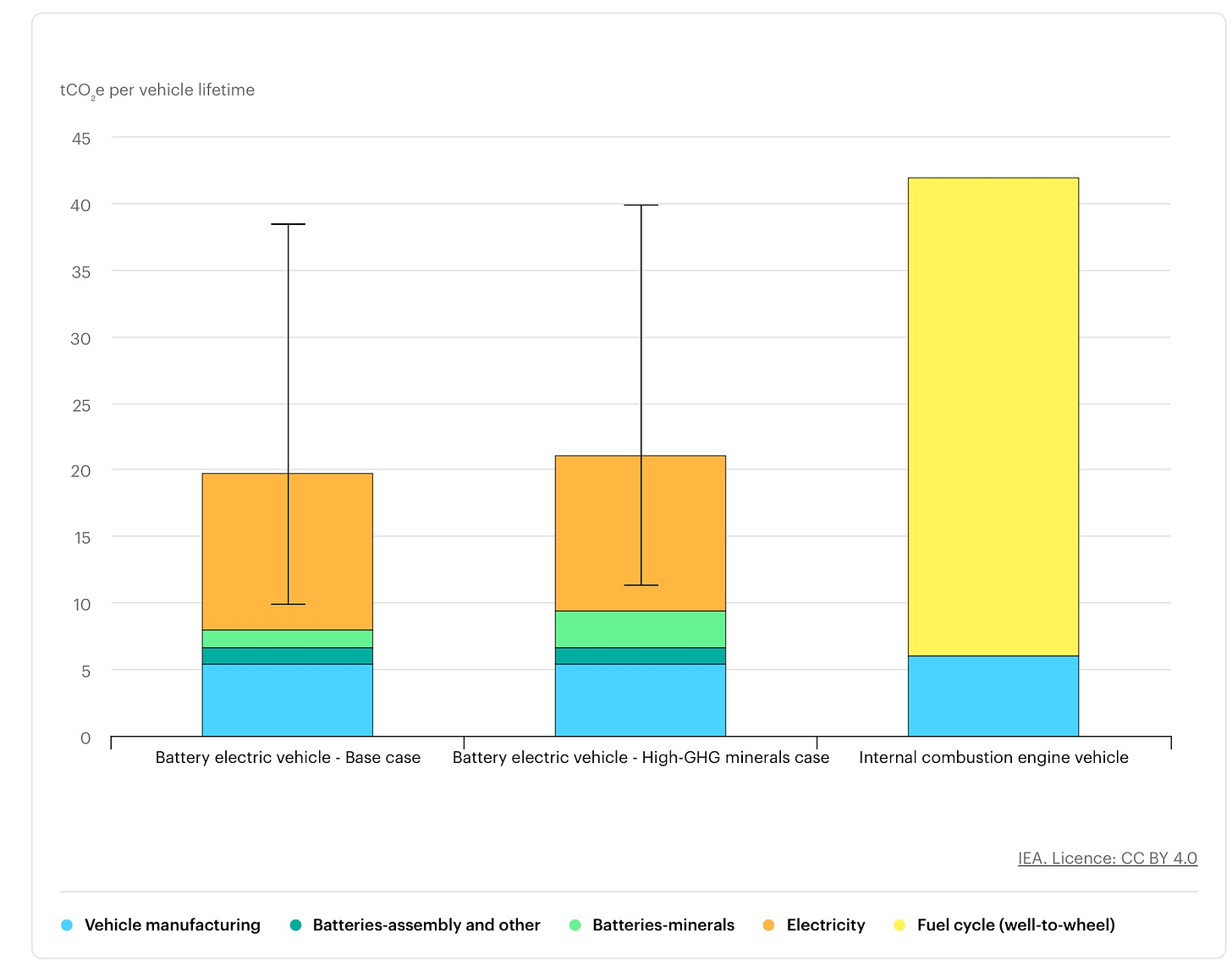Quit whining. Even the Dutch don't all cycle like the Dutch.
Many are complaining about a new study that says if we cycled like the Dutch, carbon emissions would drop by more than all of Canada's emissions. But it wouldn't be so hard.
I am turning the comments back on here because, notwithstanding a few who criticize everything that I write, comments are useful and often fun. Take the reaction to a recent study on Nature Briefing, Historical patterns and sustainability implications of worldwide bicycle ownership and use. It looked at the carbon savings and health benefits if we all cycled like the Dutch and Danes, and concluded that “A worldwide pro-bicycle policy and infrastructure development enabled modal shift like the Netherlands and Denmark can lead to significant untapped climate and health benefits.”
The story was picked up by Euronews with the title If we all cycled like the Dutch, CO2 emissions would drop by 690 million tonnes, greater than the total emissions in all of Canada, and by a planner in Rotterdam, Lior Steinberg, who wrote about it on Linkedin, noting “Remember, it's not that the Dutch are special creatures. It's simply that their built environment promotes cycling, and this can be achieved anywhere!” Steinberg’s post attracted about 130 comments, mostly dismissive, which are worth parsing.
The first point that is made often is that some people have to drive their 97-year-old neighbour to the doctor, and not everyone can ride a bike, and I have to go to Costco once a week for groceries.
“Bicycling is not realistic for most people. This never takes into consideration that most people can not live within 20–40 minutes of their office by CAR!”
But the study notes that the Dutch ride an average of 2.6 km per day, not that everyone does this every day. It’s like the old Garrison Keillor joke where all the children in the town of Lake Wobegon are above average.
When you look at the Dutch data, not everybody, not even most people, rides a bike. Most trips are by car; bikes only have a 28% modal share. The modal share in the USA is all of 3.3%, so there is a lot of room for cycling to grow until we cycle like the Dutch. Note also the share of cycling according to purpose; commuting is only 18% of cycling.
Americans have commuting on the brain because everything is designed around peak loads, but 3/4 of all trips in the USA are less than 10 miles, 60% are less than 6 miles, so there is lots of room to improve modal share there.
There were lots of comments about topography.
“Context, however, matters: The country is as flat as a pancake!!; it’s almost like it was purposely designed for riding a bike.”
One could note that the Netherlands are actually full of cars, and that it was a huge fight through the seventies to make it feel like the country was designed for riding bikes. But there are two responses to the statement that people ride because it is flat as a pancake: 1) Trondheim.
Trondheim, Norway, has so many hills that it has the world’s first bicycle lift to get people up the hills. Oh, and did I mention it’s Norway? That means cold winters and lots of snow. Hills and winter, nobody is going to cycle in that!
Then look at that modal share in 2017- 34% of kilometres covered are by bike, another 5% by e-bike. I have no doubt that these days, with the e-bike revolution, the proportion is even higher. I also suspect that e-bikes are going to put the bicycle lift out of business, because they make hills irrelevant as an issue.
“I’m in Texas; we could get away with cycling maybe 8 months out of the year but would need buses or other public transit options for the summer months.” Or- “Try cycling in summer in Texas. A lot of college kids try it (for a day) before they realize they need multiple showers per day and to change clothes every time they arrive somewhere new.”
OK, it gets hot in the Southwest, and air conditioning is what makes life comfortable there; As I keep saying, not everyone has to ride a bike for us to cycle like the Dutch. And if everyone keeps driving giant pickups belching CO2 emissions, Texas might not even be habitable. But here is another case where e-bikes make a difference- nothing is as cooling as a good breeze as the bike does most of the work.
“So you want me to take an e-bike in North American winter and travel on highways where cars are already packed and crashing into each other? Sounds like a master plan to kill everyone.”
Um, no, we need separated bike lanes and safe infrastructure and secure places to park. If we are going to go from 3.3% to 28% modal share, it is going to require some investment. On the other hand, there will be a lot fewer cars packed on the highways and crashing into each other. We might even steal a lane or two.
And then there is my favourite comment of the bunch, rolling about 5 complaints into one!
“I love cherry-picked data. Correct me if I'm wrong, but isn't Holland, for the most part, flat? My daily commute is a 60km round-trip and that includes an elevation gain of about 250m. Also saying that this could be "achieved anywhere" across the globe is ludicrously simplistic. What would the $ cost in infrastructure required for this shift be, let alone the carbon cost of that infrastructure?”
We have dealt with topography and will not question your choice of where you live, resulting in a 60 km commute. But lots of people in the Netherlands commute 60 km; they ride their bikes to the suburban train station and park them there in often wonderful facilities like this one in Tilburg that will hold up to 7,000 bikes, with a moving sidewalk to move bikes between levels.
As for the cost of infrastructure, it is a tiny fraction of the cost of car infrastructure. Look at what happened when the bridge on the I-95 in Philadelphia collapsed recently. The car-mad governments moved heaven and earth to reopen it in 12 days, spending $30 million to do it. That bridge was part of a $212 million reconstruction of the highway. How much bike infrastructure could $212 million buy?
The most glorious bike parking garage in the world, built underwater, cost C$12,800 per space to build. A bog-standard above-grade parking garage for cars costs C$40,000 per space.
And I laugh at the question of the carbon cost of the bike infrastructure. Every car replaced by a bike is a saving of between 20 (electric car) and 40 (ICE car) tonnes of upfront and operating emissions, without even talking about the infrastructure.
So to summarize:
“Cycling like the Dutch” does not mean everyone cycles everywhere all the time. There are lots of cars in the Netherlands, and people use them. Cycling like the Dutch means increasing modal share, which would not be hard if people had safe places to ride and secure places to park. We have to work on that.
Cycling infrastructure is seriously cheap. You just have to have the political will to fight for space on the road in cities. In the suburbs, there is lots of room, and the e-bike revolution will happen there.
If your 97-year-old neighbour needs a lift to the doctor, give her one, nobody is stopping you.
Cycling like the Dutch isn’t hard. I do it; we have a car that we use to get up north and for big shops, but I e-bike for almost everything. It’s faster, cheaper, and healthier. And I shop in the neighbourhood. You don’t have to go to Costco; I have never been in one in my entire life. My daughter goes occasionally and brings us 72 rolls of toilet paper that we have nowhere to store in our flat. I may pay more for a roll by shopping locally, but I do not have to pay for the car or the real estate to store it all.
The 60 km commute and the weekly drive to Costco to fill the SUV is a function of a built environment that is fundamentally flawed, running on cheap energy and massive infrastructure subsidies. It may be nice, but its days are numbered, especially in Texas, where it is over 110°F at the time of writing. Sorry.











1. Comments ON - good choice.
2. During a 20 mile round-trip bicycle ride to visit my daughter's family, I do a Costco stop and strap the 48 rolls of toilet paper to the rear carrier on my bicycle. Incidentally, for those who a thinking they are too old to bicycle, I'll be 77 years old in September.
3.
Glad you turned the comments back on Lloyd. Did you see this article about car payments? https://www.theglobeandmail.com/investing/personal-finance/article-car-payments-high-interests/
People shouldn't be whining about being told to cycle like the Dutch, they should be demanding cycling infrastructure like the Dutch have to save themselves a fortune!